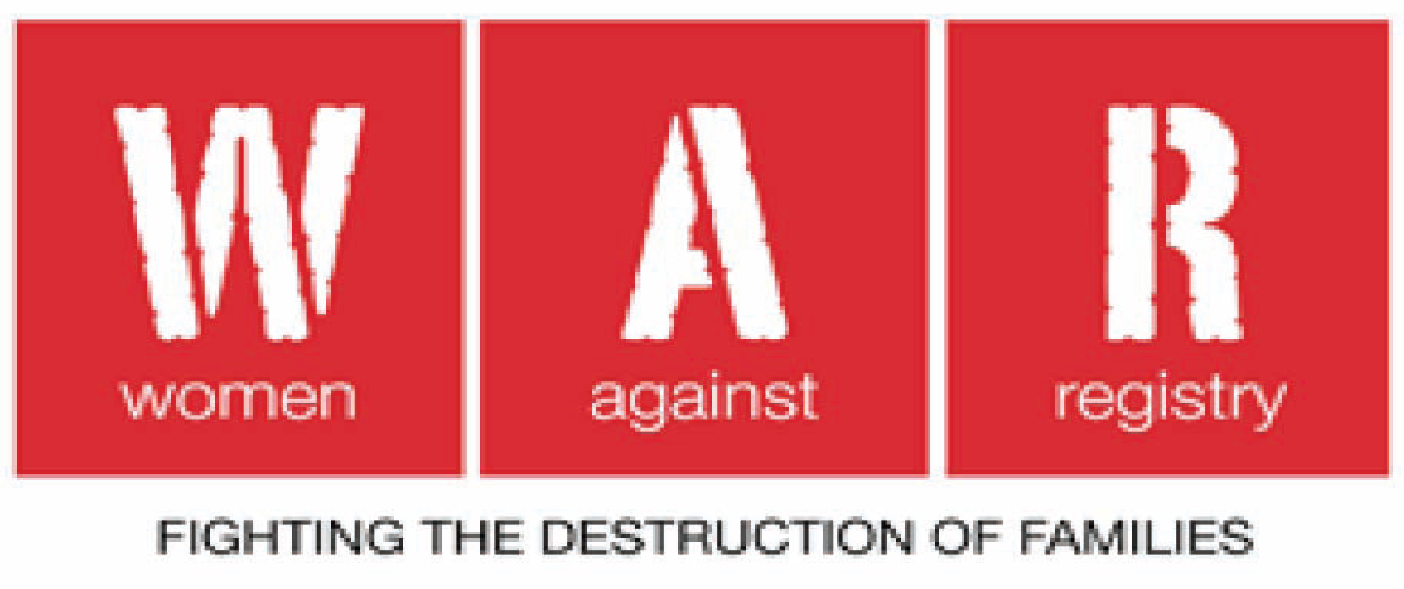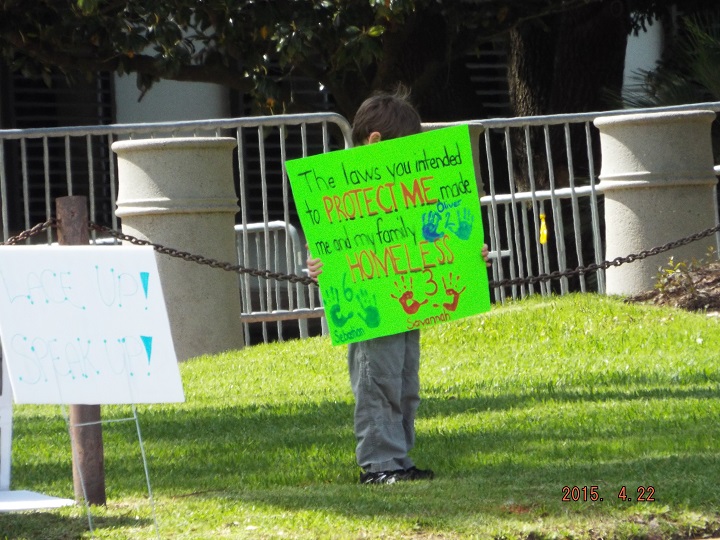Vision
The vision of this organization is to abolish the multiple Registries across this nation. Women Against Registry also seeks to restore Life, Health and Freedom to all individuals who have been injured by the requirements of registration, especially innocent family members. We foresee a day when the suffocating stigma surrounding registration will be removed in favor of proper sentencing coupled with appropriate treatment; a day when the indefinite detention of civil commitment is replaced with compassionate programs designed to heal and restore. We hope for a day when virtually all who have offended against the laws of the land will be given the opportunity to rebuild a decent, honest life with the prospect of rehabilitation, reintegration, and redemption.
Mission
Through peaceful demonstrations, civic forums, media programs, personal accounts and political events, we will attempt to educate society about the severe cost and complete beneficial void of maintaining federal, state, county, and municipal registries across this nation. The monumental costs associated with registries include monitoring, maintenance, and manpower for law enforcement organizations; the outrageously high cost of incarceration; the loss of millions of dollars in tax revenue, the truly false sense of neighborhood security; and by far, the most devastating cost of all is the loss of freedom, security, health and safety for the families associated in some way to this grand injustice. In addition, families who are trying to support their loved ones under trying circumstances, are being forced to pay outlandish commissary, phone, and travel fees.
Women Against Registry will be the voice of a vastly misunderstood subset of society.We will be the voice through stories that often relate a tragic, sorrowful, and brutally honest tale. We will be the voice of so many who, because of fear and stigma, cannot yet find their own voice.This is a difficult issue but we are resolute in our determination to be heard.
By speaking in calm voices about humanitarian treatment backed by facts; by conversing with friends, family members and strangers; by articulating points of injustice and fairness to legislators; by speaking at conferences and at schools; by expressing opinions on radio and television programs; by writing and responding to news and magazine articles; by all these methods and more, we will be heard. We are the soft but growing sound of more than 900,000 citizens required to register and perhaps more than 2.5 million family members.
There is simply no value in a registry system. We seek fair treatment and a second chance for those deemed (by an unbiased risk-assessment process), to be of little or no threat to society. There is incontrovertible scientific evidence showing extremely low recidivism rates for those people who have committed a sex offense. As such, there are an exorbitant number of individuals suffering the stigma of registration unnecessarily. It is the mission of Women Against Registry to change that reality.
We Believe
- ALL children have the right to grow up in an environment that is safe from harm.
- ALL families have the right to heal after pain.
- The public deserves fair laws and policies that will achieve these goals.
- Placing a person, and by association, an entire family on a registry is demonstrably ineffective at protecting women and children from harm; in fact, it does just the opposite.
- Families, and in fact, entire communities are subjected to vulnerability, fear and divisive behavior when legislators pass reactive registry laws in the name of public safety. Numerous scientific studies have clearly indicated that registries do nothing more than perpetuate a false sense of security.
- Scientific studies show that with treatment when appropriate, a home, a job, and a stable, supportive environment most people on the registry will not re-offend.
- Some people, perhaps many, could avoid commiting a sex offense and having to register if they could seek treatment at the first acknowledgement of a problem. But many are rightfully afraid of the stigma and legal response they face in these circumstances.
- People who commit a sexual offense should be punished with a fair sentence equivalent to the severity of the crime – nothing more.
- The current method of ‘one-size-fits-all’ clinical therapy and punitive treatment does more harm than good. A proper program should include a detailed assessment based on current risk levels and a therapy plan that considers psychological make-up and mitigating circumstances.
- After paying their reasonable debt to society, perpetrators should be allowed every opportunity to reintegrate back into the community.
- The general public gains no advantage by knowing the names and locations of those who have registered. However, these individuals and their families risk significant reprisals as a result of the public knowing their information.
- As with any crime category, true violent and predatory people with no motivation to change will always be a risk to public safety.
- A trustworthy psycho-sexual risk assessment that shows a pattern of past violent or predatory sexual behavior should warrant (perhaps) a longer sentence, a longer probationary period, or monitoring; but not a registration program.
- Persons should have a clear avenue to exit the system if a low-risk assessment can be achieved by means of a step-by-step, measurable treatment program, or by having lived in the community offense free for a number of years.
- When the family is placed on a registry:
-
- some or all members face probable loss of jobs and the inability to find gainful employment.
- they may face probable eviction from their apartment because of landlord bias, or because the landlord is being harassed by other tenants.
- they may be forced to move because of proximity to a school or a daycare or a park.
- some or all members face harassment by neighbors, vigilantes, and even law enforcement personnel.
- they may have signs placed in their yard, they may have their property damaged, or they may be attacked by vigilantes.
- they often live in constant fear for their own safety.
-
Goals Allowing Families to Re-Integrate
- Rescind punitive registry laws; abolish registries.
- Rescind civil commitment statutes in lieu of practices designed to help perpetrators to become productive members of society.
- Challenge civil and judicial rules and procedures, including irrational sentencing practices.
- Aid the reintegration process by eliminating residency restrictions.
- Prohibit employers, schools and apartment owners/managers from asking if applicants have been convicted of a crime.
- Provide assistance through specifically designed organizations to help those recently released from incarceration to successfully reenter society.
- Provide guidance and oversight to probation officers so they understand that their mission is to monitor and help those under their supervision; not to harass.
- Promote ‘diversion programs’ in lieu of re-incarceration for those who break parole with minor non-sexual infractions such as arriving late to a registry appointment or losing a job for reasons out or their control. These infractions should never be considered as recidivism or used to bolster statistics that are intended to burden a segment of society.
- Stop the egregious policy that allows lengthy incarceration to create onerous debt and in turn, seriously curtails, and often completely prevents restoration.
- Strive for cost-effective laws that will truly protect children and adults from sexual harm.
- Ensure that all people are offered equal protection against unlawful discrimination.
- Promote and strengthen positive and healthy relationships among all persons affected by a sexual offense; and help all of those people to heal by restoring the victim, restoring the perpetrator, restoring the affected families, and restoring the community.
- Develop educational programs and public service announcements that teach parents and professionals ways to empower and protect children.
- Change the law so that all acts of
- harassment and vigilantism against those required to register or their family members are treated as “Hate Crimes.”
* * * * *
A Message from the President of Women Against Registry
Women Against Registry media contact:
800-311-3764, option #1
contact@womenagainstregistry.org




Recent Comments